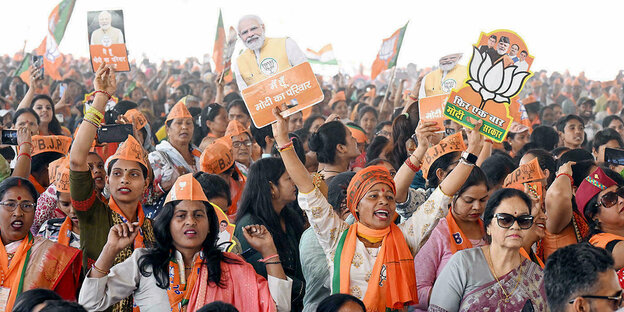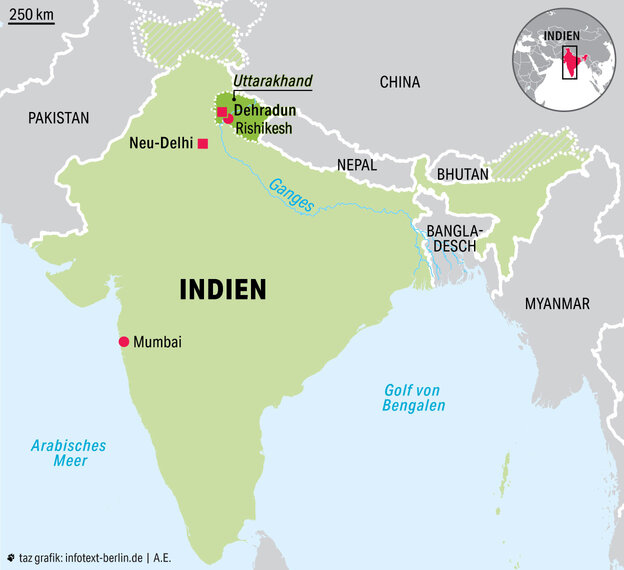In the Hindu-majority northern Indian state of Uttarakhand, ruling Hindu nationalists are testing their anti-Muslim course.

Supporters of the Hindu nationalist People's Party (BJP) at an election rally in Uttarakhand on April 2. Photo: Hindustan Times/Sipa/Picture Alliance
DEHRADUN/RISHIKESH taz | A small truck makes its way through the heat of Rishikesh, the Indian capital of yoga. Music plays over the loudspeakers and a male voice praises the local candidate of the ruling BJP party, Trivendra Rawat, as the only electoral option. “He belongs to Modi's family,” they say. “Send it to Parliament to strengthen Modi: Make Modi Prime Minister for the third time!”
The most important elections in the world From April 19 to June 1, a new parliament will be elected in seven rotating stages in the world's most populous country. 497 million men and 471 million women have the right to vote. More than a fifth of voters are under 29 years old.
Narendra Modi He has ruled India since 2014 and is now the favorite to win his third five-year term. Under the 73-year-old's rule, India's infrastructure was greatly modernized, but civil rights were also restricted. Recently, opposition politicians have become the focus of legal proceedings perceived to be motivated by partisan politics. The accounts of Congress, the largest opposition party, have been blocked since January.
Uttarakhand It was initially separated from the state of Uttar Pradesh as Uttaranchal in 2000 until it was renamed in 2007. It is slightly larger than Switzerland, but has almost twice as many inhabitants: 17 million. More than 80 percent of them are of Hindu faith.
This is an election campaign in Uttarakhand, a Himalayan state north of the capital New Delhi and west of Nepal. Voting will take place here this Friday in the first of seven phases. The Hindu nationalist BJP wants its Prime Minister Narendra Modi to continue ruling India.
Passersby are not intimidated. You already know the campaign songs. Shortly before the first vote in the Indian elections, which will take place over six weeks, advertising in the respective electoral districts ends.
Until then, huge posters of Prime Minister Modi promoting the “Modi Guarantee”, as the BJP's manifesto is called, will be omnipresent. Modi and his party already visually dominate the landscape of the state of Uttarakhand. The 73-year-old Hindu hardliner is the favorite. During his visit they celebrate him like a pop star. “Modi has built highways all over India,” praises his supporter Nadeem Zaidi.
But the elections to fill the 543 parliamentary seats in Delhi are yet to be decided. Although tiny Uttarakhand only has five representatives in the national parliament, it is symbolically important to the BJP because here, in the state also known as “Dev Bhoomi” (Land of the Gods), where the source of the Ganges meanders through the Himalayas, There are four sacred Hindu sites.
Modi is celebrated as a pop star
The election campaign of the opposition Congress candidate, Ganesh Godiyal, runs through narrow mountain streets, passing ashrams, small shops and yoga studios. “Long live the Congress Party, long live Ganesh Godiyal,” shout his followers amid the roar of motorcycles and drums. They wave flags with one hand, a symbol of their party.

This robust 57-year-old man with a mustache, dresses in white, wears flower chains around his neck and was already politically active before the BJP replaced the Congress in power. He believes that “people will vote for change.”
Among his followers is Niraj, 25, who follows the column on his motorcycle. Lalita Devi also came. “Ganesh is a good candidate, he supports us, that's why we support him,” says this mother of two children. The Congress Party is helping the people. She speaks surprisingly positively about Prime Minister Modi, but is distrustful of the BJP politicians around him.
Five years ago, the BJP won a record victory in Uttarakhand. Now their candidates are supported by Delhi because for them the main question is how many seats Modi will get re-elected. In its manifesto, the BJP even calls for a mandate to shape India for the next thousand years.

This article was made possible by the financial support of Forschungsfonds Ausland eV. You can support the research fund through a donation or membership.
➡ More information here
Warnings of a new right turn
Critics, on the other hand, warn of a further shift to the right and a weakening of institutions and press freedom. They also point to the ideological backbone of the BJP, its parent organization RSS (“National Voluntary Organization”), which was founded in 1925 with the goal of a Hindu nation. The BJP is already using Uttarakhand as a testing ground for the RSS agenda.
The paramilitary organization is replacing some public schools in the mountainous region of Uttarakhand. Even now RSS is active. RSS general secretary Arun Kumar arrived in Uttarakhand in October. Therefore, it is no surprise to him that the current Prime Minister Pushkar Singh Dhami is also an RSS cadre like Prime Minister Modi.
The Congress Party criticizes the growing divide between Hindus and Muslims in the state. For example, Dhami announced that he would demolish illegal buildings: But underneath there were many “mazars”, small shrines for the Muslim minority.
Congress leader Priyanka Gandhi Vadra accused Modi of neglecting Uttarakhand during the recent flood disaster: “Today's reality is inflation, unemployment, leakage of government exams and corruption, and not what Modi told them.” is showing all of you,” he said in Haridwar, where the Congress Party is. It is said that he has a chance of obtaining a parliamentary mandate.
Prohibition of slaughter of cows and beef
However, a political experiment by the ruling Hindu nationalists is becoming visible in the Himalayan region: since 2018, Uttarakhand is one of the Indian states in which cattle slaughter and the sale of beef are strictly prohibited.
In fact, just weeks after the BJP's latest election victory in the state, its Supreme Court even declared itself “legal protector of cows”, in a unique decision in the country.
This was followed in 2022 by an amendment to the Uttarakhand Religious Freedom Act, under which “illegal conversion” can be punished by up to ten years in prison.
However, former director of Amnesty International India Aakar Patel stresses that “returning to the original religion”, i.e. Hinduism, is not considered a conversion under this law. If Muslims, Christians or Buddhists revert to Hinduism under pressure, it will go unpunished.
Uttarakhand as “Land of Jihad”?
Earlier this year it was decided to introduce a uniform civil code in Uttarakhand. Since then, cohabitation with a partner outside of marriage must be registered. “It is intimidating that this not only has to be reported but also approved,” says a young woman from Dehradun.
Interfaith tensions have increased in recent years. Uttarakhand chief minister coined the term 'land of jihad', criticizes Congress politician Garima Mehra Dasauni. That is worrisome.
Mohammed Zahid learned how dangerous the concept of propaganda can be. He is sitting in one of the many clothing stores in the small town of Vikasnaga. This man in his forties stares at the counter of his store, where there is a pamphlet about the upcoming elections. A fan sounds above him; He can't afford to have air conditioning. Business is not going well, he says. Last year brought an involuntary new beginning for him and his family: Zahid had to abandon his business and his home after threats from far-right Hindus.
He recalls the attacks on shops and houses of Muslims in Purola following accusations of “love jihad”, a term used by right-wing Hindus to accuse Muslims of using marriage to connect Hindu women with Muslim men and thus persuade the former to convert to Muslims in the country.
Right-wing political Hinduism laboratory
“We had good relations with our neighbors,” he says. “I was successful until the incident occurred.” Of the approximately 250 Muslims who once lived in their neighborhood, many fled after the riots. Despite being a member of the Hindu nationalist BJP, Zahid, a Muslim, could not find protection.
“In Uttarakhand, the BJP and the RSS are following a strategy reminiscent of that of Gujarat,” says political observer SMK Kazmi. Religious violence broke out there in 2002, when Gujarat was ruled by Narendra Modi. The victims were predominantly Muslims. Modi and his government at the time did nothing to stop the violence, but instead fueled it.
Kazmi sees in Uttarakhand a second “Hindutva laboratory”, that is, of a right-wing political Hinduism. There, Hindu nationalists politicized socially sensitive issues such as land ownership and women's welfare and used divisive terms such as “love jihad” and “land jihad” (land grab) to polarize public opinion, Kazmi said. Therefore, he sees Uttarakhand as a duel between the BJP and the people rather than political parties.
Youth unemployment is barely talked about
In Uttarakhand, the BJP recently managed to win a large proportion of Hindu votes. But this cannot hide the problems there: youth unemployment is also a problem in the Himalayan state that only a few, like independent candidate Bobby Panwar, address.
Many still complain that the opposition is too weak. For Jyoti Singh Rathore, the BJP's work at the national level is crucial. “If the BJP wins the elections, it will be only because of Modi,” he says. If Modi is in power, he will improve India's image. Opposition critics and activists worry that India is drifting toward autocracy.
Collaboration: Mayur Yewle, Asif Ali
